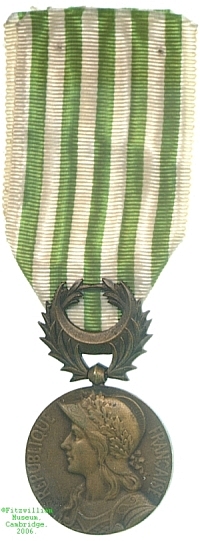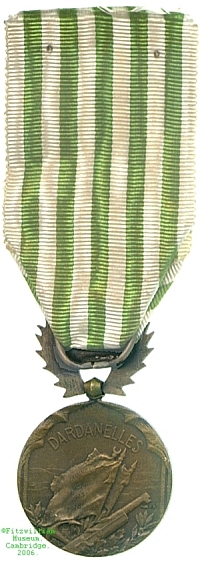Médaille Commémorative des Dardanelles, issued 1926

Obverse, a bust of Marianne in wreathed helmet facing left
|

Reverse, a crossed artillery piece and axe before two standards, the nearer of which bears legend "HONNEUR / PATRIE / 1913 / 1918"; the artist's name can be seen in the left of the field in tiny lettering, and "R. F." for Republique Française at the right
|
<- Previous | Next ->
Back to gallery page
Médaille Commémorative des Dardanelles, 1926 (Great War)
After Germany's diplomacy successfully induced Ottoman Turkey to join the Great War on Germany's side in late 1914, a substantial naval force was amassed by the Allies against Turkey. Key to its operations was control of the Dardanelles Strait between the Aegean Sea and Sea of Marmora.
A large naval force was assembled to open the Straits, but heavy losses necessitated a change of plan to an infantry assault over land on the Gallipolli Peninsula to take control of the Straits. A force principally composed of Australian and New Zealand troops, supported with British home units and French marines, was landed and held on on the Peninsula for ten dogged months, mounting numerous ineffective offensives while naval support dwindled. Turkish resistance on all fronts proved more solid than had been anticipated and the troops were finally withdrawn in October 1915 when Bulgaria joined the war on the German side. Those who remained in the theatre became part of the Armée d'Orient at Thessalonika, for which they were awarded a separate decoration.
French troops who survived combat in the Dardanelles, in which French forces took nearly as many casualties as the Australians, were in 1926 awarded this medal. The piece is unnamed, and the identity of its recipient thus unknown. Lester Watson purchased it at some point before 1928.

